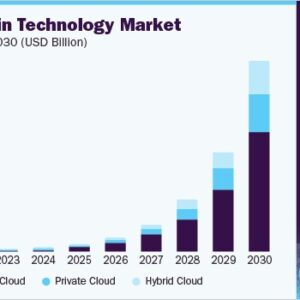How
Blockchain Technology Will Impact Different Industries By 2028?
Over the recent
years, blockchain has gained massive popularity on a global level and it is
continuing to gain momentum even in 2022. Popularity of blockchain technology
is now expanding more than ever as it continues to be integrated into various
industries such as banking, music, accounting, and online marketplaces, among
others. Blockchain technology has witnessed peaks of hype and downfalls but
with rising popularity of metaverse and cryptocurrencies, it is expected to
witness an upward climb again.
Blockchain
Takes CenterStage As The World Shift Towards A New Digital Era
Blockchain is a digital ledger technology that enables digital
transactions in a secure and immutable manner. These transactions are recorded
securely across several computers that are connected in a peer-to-peer
network. In the post-pandemic world, blockchain is at the forefront as we
shift towards a new digital era. Blockchain records transactions with immutable cryptographic signature
known as hash. Each block in the chain comprises a number of transactions and each new
transaction that occurs in the blockchain are then added to the ledger of a
participant. If any block in the chain is changed, it is directly apparent that
it has been tampered with. Blockchain essentially reduces hacking,
cyberattacks, and data theft of sensitive information. Popular blockchains such
as Bitcoin, Ethereum, Tezos and Solana, among others are constantly and
continually evolving and growing as increasing number of blocks continue to be
added to the chains. Blockchain is apparently different from normal databases
because it is not run by anyone – but by the people who are using it.
With the expectation that blockchain
technology would revolutionize many industries by 2028, Digital
Currency Reclaim (DCR) sees itself as a key enabler of this
change in thinking. Supply chain management, healthcare, banking, and other
industries can all benefit from the customized blockchain solutions,
specialized advisory services, and extensive training programs that your organization
provides. We can assist clients in navigating the changing environment and
taking advantage of chances for innovation and expansion in the
blockchain-driven future by forming strategic alliances, doing proactive
research, and engaging with emerging technologies.
Since data on the blockchain cannot be modified, it has emerged as a
disruptor for various end-use industries that deal with sensitive data such as
payments, cybersecurity, banking, and healthcare industry. Potential
applications of the blockchain technology includes fund transfer, voting,
settling trades, and others. Among other things, blockchain is the technology
that enables them existence of cryptocurrency. Bitcoin, one of the best-known cryptocurrencies, is the prime example for
which the technology was invented and introduced. Blockchain, however, has numerous
applications beyond Bitcoin and cryptocurrency and from the point of view of
business, it can contribute to the development of software that can facilitate
next-generation business processes. Blockchain has the potential to significantly
improve business process that occur between companies, in turn, drastically
lowering the cost of trust. This leads to higher returns on investments as
compared to other internal investments.



